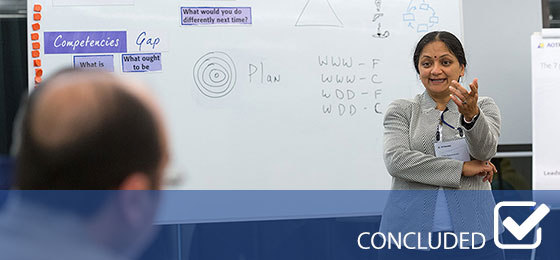Faculty Education Program
Education has long been a pillar of the AO Foundation, and a newly launched, two-year, cross-divisional Strategy Fund project seeks to fortify that pillar by evaluating the impact of the AO’s Faculty Education Program (FEP) on FEP graduates.
The project, The Evaluation of the Faculty Education Program, is using objective outcome tools and questionnaires to evaluate teaching performance at AO courses, as well as interviews to gauge the impact of the course on faculty members’ practices and attitudes toward teaching, including the use of feedback in daily teaching activities.
Dr Greg Berry, a member of the AO North American Regional Education Team (AONA RET) and the orthopedic trauma team at McGill University Health Center in Montreal (CA), is leading the project with support from AONA Regional Education Team (RET) members Roger Wilber, MD, Brett Crist, MD, Mark Reilly, MD, and Michael Baumgaertner, MD. Other key collaborators are educational consultant Robert Fox, PhD, the AO Education Institute’s Miriam Uhlmann, Chad Coles, MD, Queen Elizabeth II Health Sciences Centre in Halifax (CA), and Prism Schneider, MD, University of Calgary, Alberta (CA).
“Education has always been a pillar of the AO, training tens of thousands of surgeons over the years. We are always trying to improve the courses and bring them up to date in terms of teaching methods and content,” Berry said. “The genesis of our FEP program was the idea, ‘Maybe we should consider focusing on the quality of the teachers themselves.’”
In December 2013, RET members from around the world gathered in Davos, Switzerland to discuss the direction of the FEP. Educationalist Robert Fox and Miriam Uhlmann, Manager Faculty Development at the AO Education Institute, proposed conducting educational research around the FEP. The AO Strategy Fund call for proposals came at just the right moment.
“Without the Strategy Fund, I think it’s unlikely we would have gotten funding for this project. Funding for educational research isn’t a hot topic perhaps because there is less urgency attached to it,” said Berry. “I am extremely grateful for the Strategy Fund because it really permits a lot of novel ideas to be evaluated and pursued.”
To date, FEP effectiveness was measured through feedback gathered from participants at the end of a course and the assessment toolkit.
“But that was not an empirical approach,” Berry said, explaining that the Evaluation of FEP project will result in two studies: one quantitative and one qualitative. To make the evaluation possible, Berry developed a lecturing performance e-tool which will evaluate whether FEP graduates perform better than non-FEP graduates.
“Our hypothesis is that the FEP has made lecturers better, so they should perform better than non-graduates,” he said, emphasizing that the new FEP competency-based tool will be administered by unbiased blinded evaluators, allowing the project team to compare the teaching performance of FEP graduates to non-FEP graduates at a series of AO courses.
After being thoroughly tested at courses in North America this year, manuscripts detailing the evaluation and findings will be prepared, with submission scheduled for late 2016. Berry said that the evaluation tool will provide valuable feedback as to how faculty performance can be improved, and studies resulting from the project will buttress the AO’s reputation as a leader in high-quality surgical education.
Do you need FEP information?
Please check the AO Education Institute - Faculty Development webpage


